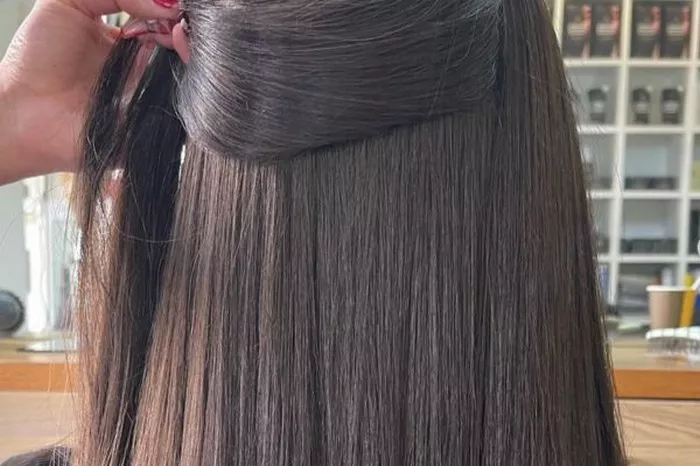Hair is a unique part of our identity, but when it feels overly heavy, it can become a daily frustration. Heavy hair might weigh you down physically and mentally, making styling difficult or causing discomfort. If you’re asking, “Why is my hair so heavy?” this essay will explore the possible reasons, from your hair’s natural structure to external factors like products or health habits. By breaking down each cause in simple terms, you’ll gain clarity and learn how to manage your hair better.
Hair Structure: Thickness, Density, and Porosity
Your hair’s weight starts with its basic structure. Three key elements play a role: strand thickness, density, and porosity.
Strand Thickness
Hair thickness refers to the width of individual strands. If your hair is coarse or thick, each strand has a larger diameter, which adds weight. For example, a single thick strand can weigh twice as much as a fine strand. People with Asian or African ancestry often have thicker hair, while those with European roots may have finer strands.
Hair Density
Density means how many hair strands you have per square inch on your scalp. High-density hair (more strands) naturally feels heavier. If your scalp looks “full” even with short hair, you likely have high density. On average, humans have 80,000–120,000 hairs, but this number can vary widely.
Hair Porosity
Porosity describes how well your hair absorbs and holds moisture. Low-porosity hair has tightly closed cuticles (the outer layer), making it resistant to moisture. This can cause products to sit on the hair’s surface, creating buildup that adds weight. High-porosity hair absorbs moisture quickly but may become overly saturated, leading to a damp, heavy feel.
Hair Type and Texture
Your hair’s natural texture—straight, wavy, curly, or coily—also affects its weight.
Straight Hair
Straight hair tends to hang flat and close to the scalp. Without natural volume, the weight of the hair is more noticeable. Long, straight hair can feel like a “blanket” on your head.
Curly or Coily Hair
Curly hair has twists and bends that create volume, which distributes weight differently. However, if curly hair is dense and thick, the combined weight of many coiled strands can still feel heavy. Additionally, curly hair often requires more products (e.g., creams, gels), which may contribute to buildup.
Fine vs. Coarse Texture
Even if your hair is fine (thin strands), high density can make it heavy. Conversely, coarse hair with low density might feel lighter than expected.
Hair Length
Long hair is almost always heavier than short hair. For example:
- Shoulder-length hair weighs 2–4 ounces (57–113 grams).
- Waist-length hair can weigh 8–12 ounces (227–340 grams).
The longer your hair, the more its total weight pulls downward, especially when wet.
Product Buildup
Hair products like shampoos, conditioners, and styling gels can leave residue. Over time, this buildup coats the hair, making it stiff and heavy. Common culprits include:
- Silicones: Found in many conditioners, they create a temporary shine but can accumulate.
- Waxes: Used in pomades or styling creams, they add a sticky layer.
- Dry Shampoo: Powder-based products absorb oil but leave particles behind.
How to Fix Buildup
Use a clarifying shampoo once a week to remove residue. Look for ingredients like citric acid or apple cider vinegar.
Environmental Factors
Your environment plays a surprising role in hair weight.
Humidity
Humid air adds moisture to your hair, especially if it’s porous. Hair can absorb up to 30% of its weight in water, making it feel limp and heavy.
Hard Water
Water with high mineral content (calcium, magnesium) leaves deposits on hair. Over time, this makes hair dull and weighed down.
Health and Lifestyle Habits
Internal health issues can change your hair’s texture and weight.
Diet and Nutrition
A lack of protein, iron, or vitamins (like Biotin) weakens hair, causing breakage. Paradoxically, damaged hair may feel heavier if split ends tangle and clump together.
Hormonal Changes
Pregnancy, menopause, or thyroid imbalances alter hair growth cycles. For example, estrogen prolongs the hair’s growth phase, leading to thicker, heavier hair.
Stress
Chronic stress triggers hair loss (telogen effluvium), but regrowing hair may come in thicker temporarily.
Hair Care Practices
Your daily routine might unknowingly add weight.
Over-Conditioning
Applying too much conditioner or deep treatments can suffocate hair. Focus on the mid-lengths and ends, not the roots.
Heat Tools
Excessive blow-drying or straightening damages the cuticle, making hair porous and prone to absorbing excess moisture.
Tight Hairstyles
Ponytails or braids stretch the hair shaft, causing damage that makes hair brittle yet dense-feeling.
Genetic Factors
Genetics determine your hair’s default settings—thickness, density, and growth rate. If heavy hair runs in your family, it’s likely a natural trait.
Medical Conditions
Rarely, heavy hair links to health issues like:
- Polycystic Ovary Syndrome (PCOS): Causes excess androgen hormones, leading to thicker hair growth.
- Scalp Infections: Fungal infections (e.g., seborrheic dermatitis) increase oil production, weighing hair down.
Solutions for Heavy Hair
- Layered Haircuts: Remove bulk while keeping length.
- Lightweight Products: Use water-based serums instead of oils.
- Regular Trims: Prevent split ends from tangling.
- Scalp Care: Balance oil production with gentle exfoliation.
Conclusion
Heavy hair results from a mix of genetics, structure, habits, and environment. To address it, start by identifying your hair type, evaluating your products, and considering health factors. If the problem persists, consult a stylist or dermatologist for personalized advice. Remember, heavy hair isn’t a flaw—it’s a sign of your hair’s unique characteristics, and with the right care, it can become your best asset.
Related topics:
How to Get Volume in Heavy Hair: What You Need To Know
How to Reduce Heavy Hair Fall: Everything You Need To Know
What Can Go Wrong with Hair Transplant? Potential Risks Explained


